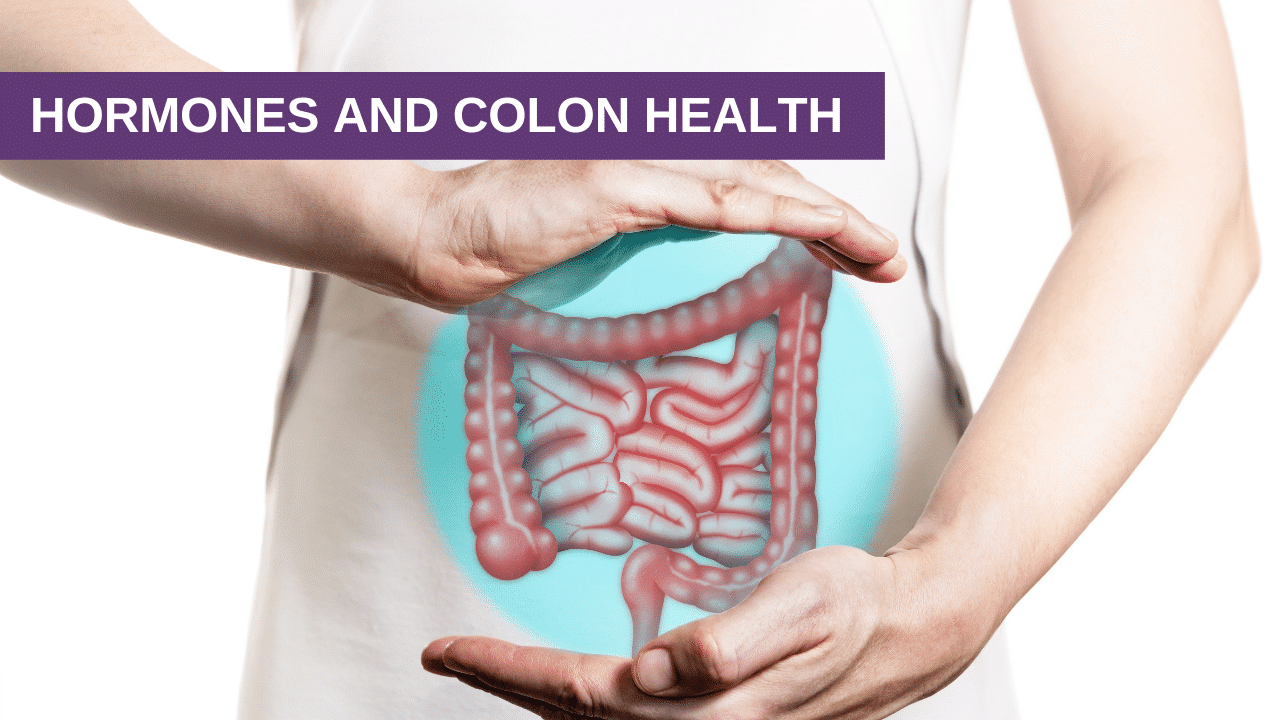How do hormones affect your colon health? Let’s talk about it.
Hormones definitely affect the health of your colon.
Estrogen promotes a healthy colon epithelial layer. Estrogen deficiency in post-menopause can lead to dysplasia or abnormal cells in the colon.
Progesterone and estrogen work together to heal to promote a healthy colon and prevent colon adenomas.
Adenomas are a tumor – cells growing abnormally – and while most are benign, some can be dysplastic, meaning they can turn into cancer and some can be cancerous. Fortunately, estradiol and progesterone regulate the abnormal proliferation of cells in colon cancer. These hormones help promote apoptosis or the death of abnormal cells.
Studies show that higher levels of sex hormone binding globulin which is a protein produced by the liver, in response to how much estrogen your body makes, helps to lower the risk of cancerous adenoma or colon cancer. Studies also show that when testosterone and insulin levels are elevated, they decrease sex hormone-binding globulin, which increases the risk of colon cancer. Oral estradiol increases sex hormone-binding globulin.
I’m 61 and just had my second colonoscopy.
My first one ten years ago was clear. But now that I’m postmenopausal, I had developed a single tubular adenoma which is benign. I’ll be following up with a colonoscopy in about five years. In spite of a, very healthy fiber-rich diet, this benign adenoma occurred because my estrogen levels are lower in the past decade than my healthy reproductive levels. Your colon health is yet another reason to keep your hormones in balance. But it’s difficult to do when you go through the change.
If you have colon cancer in your family, having an early colonoscopy starting in your 40s, maybe even earlier according to when colon cancer affects your family, can actually help to detect these abnormal growths called polyps and get them removed before they turn into something worse.
More frequent surveillance can be done by checking stool DNA which can pick up dysplasia and colon cancer. Then a colonoscopy can be done to biopsy abnormal tissue and remove precancerous polyps. If you’re at high risk for colon cancer – you have a strong family history of colon cancer, you smoke, or have colitis, you will need more frequent surveillance.
Your diet definitely affects your colon health.
It needs to be plant-based, rich in a variety of colorful fruits and vegetables, low in meats and saturated fats, and high in fiber. You need at least 25 grams of fiber a day. A diet rich in calcium can be protective against colon cancer. Try to get at least 1000 milligrams of calcium in your diet, the richest sources come from dairy. You may need supplements. Folic acid can help reduce the risk of colon cancer and polyps. You need at least 400 micrograms per day. If you have genetic mutations that interfere with folic acid metabolism, you want to use methyl tetrahydrofolate. Research shows that the daily use of baby aspirin can help to reduce colon cancer but talk to your health care provider.
People who have an active lifestyle and exercise regularly have a reduced risk of colon cancer.
If you smoke – stop. And if you are hormone deficient, discuss with your healthcare provider the benefits of HRT for you. Supporting your hypothalamus with Genesis Gold® can help optimize cellular detoxification pathways and regulate healthy hormone receptors so that you’re less likely to develop abnormal mutant cells that will become cancerous.
If you have any questions about hormones and colon health, please join me in our Hormone Support Group where I answer your questions live. You can access it by signing up for my free Hormone Reboot Training.
References:
Estrogens, phytoestrogens and colorectal neoproliferative lesions; Michele Barone, Sabina Tanzi, […], and Alfredo Di Leo; Genes Nutr. 2008 Apr; 3(1): 7–13.
https://www.ncbi.nlm.nih.gov/pmc/articles/PMC2311500/
Immunohistochemical Expression of Estrogen and Progesterone Receptors in Human Colorectal Adenoma and Carcinoma Using Specified Automated Cellular Image Analysis System: A Clinicopathological Study;
Ban Jumaa Qasim, Hussam Hasson Ali, and Alaa Ghani Hussein l; Oman Med J. 2011 Sep; 26(5): 307–314.
https://www.ncbi.nlm.nih.gov/pmc/articles/PMC3215447/#__ffn_sectitle
Plasma sex hormones and risk of conventional and serrated precursors of colorectal cancer in postmenopausal women; Dong Hang, Xiaosheng He, …Mingyang Song Show authors; BMC Medicine; volume 1 January 2021
https://bmcmedicine.biomedcentral.com/articles/10.1186/s12916-020-01895-1



0 Comments